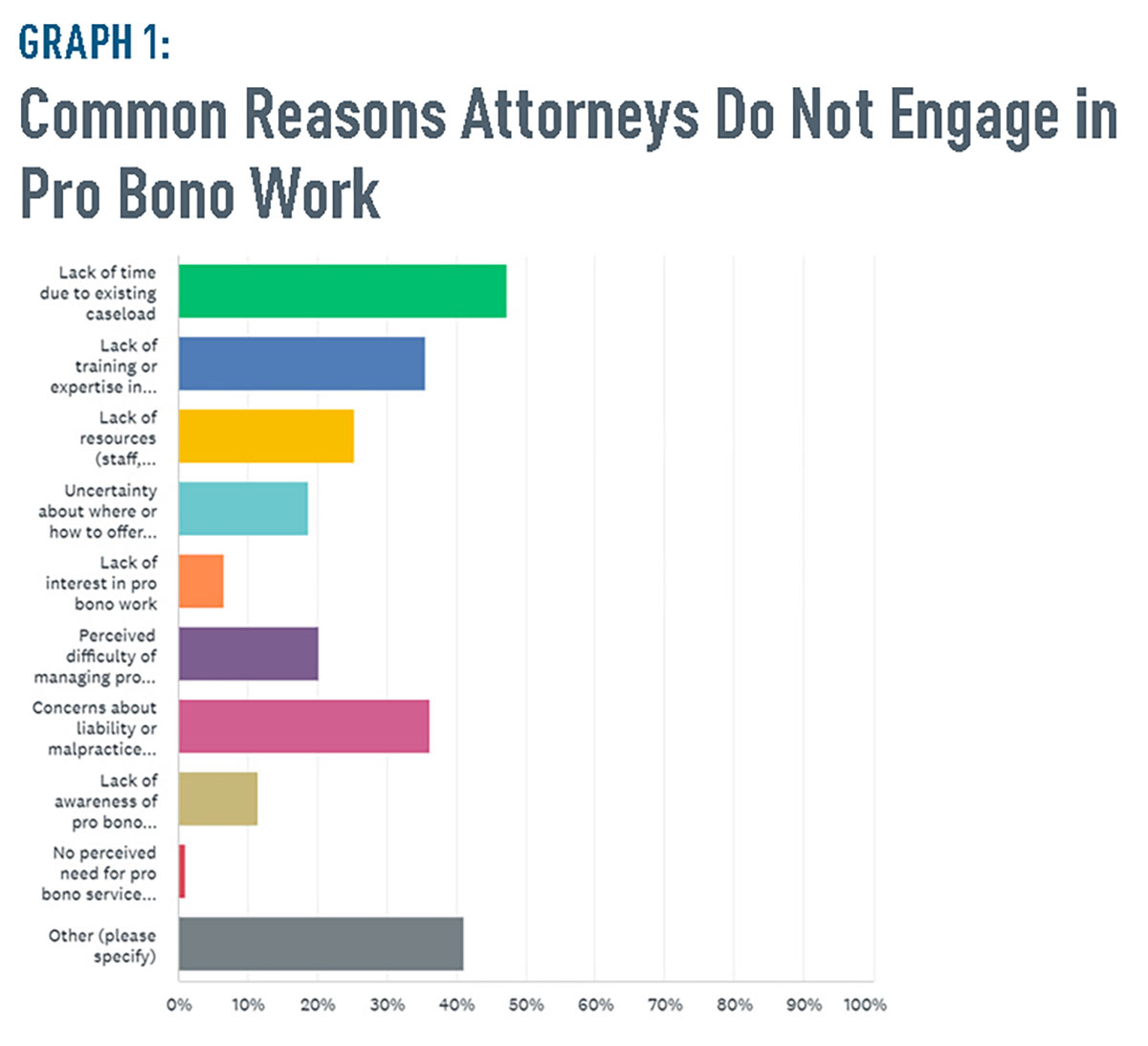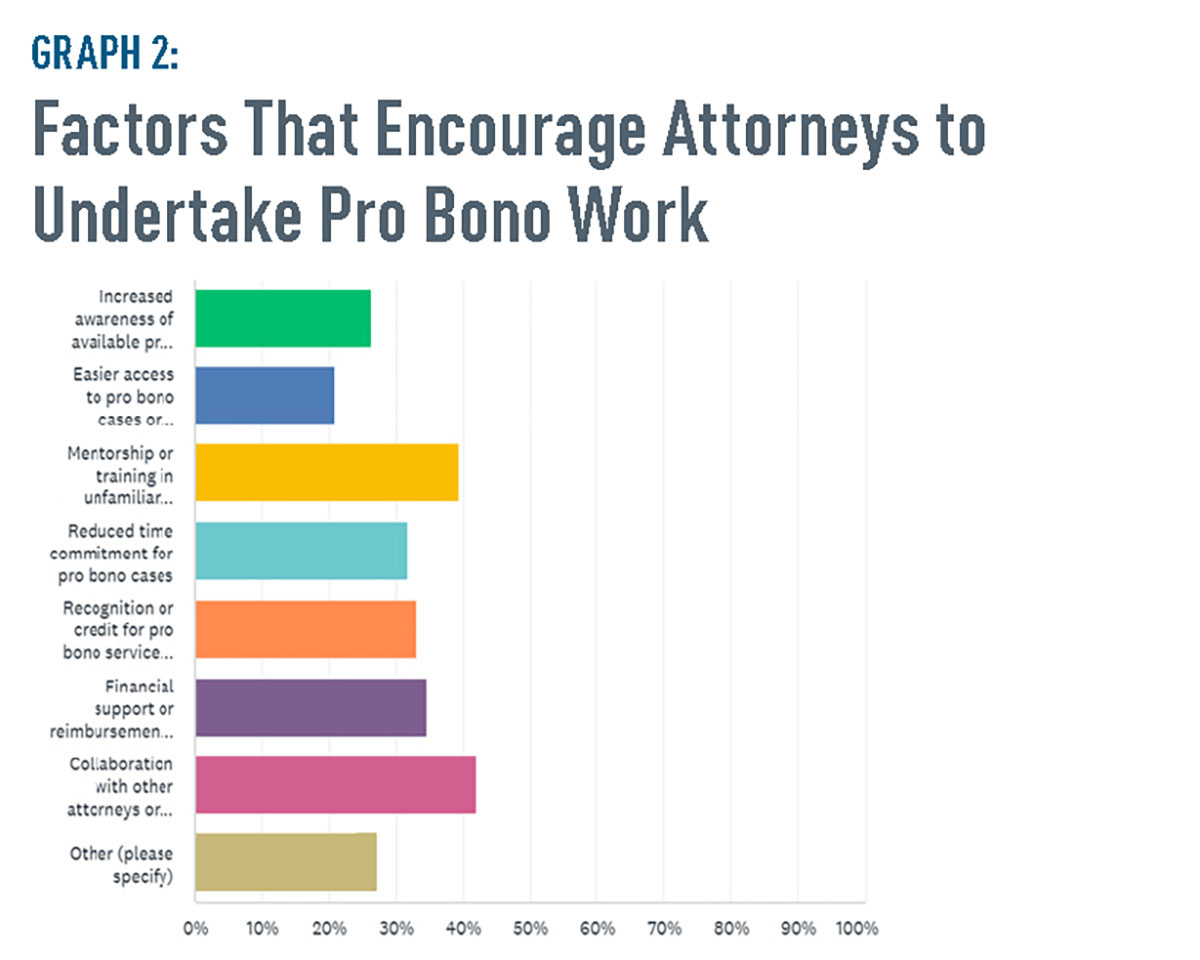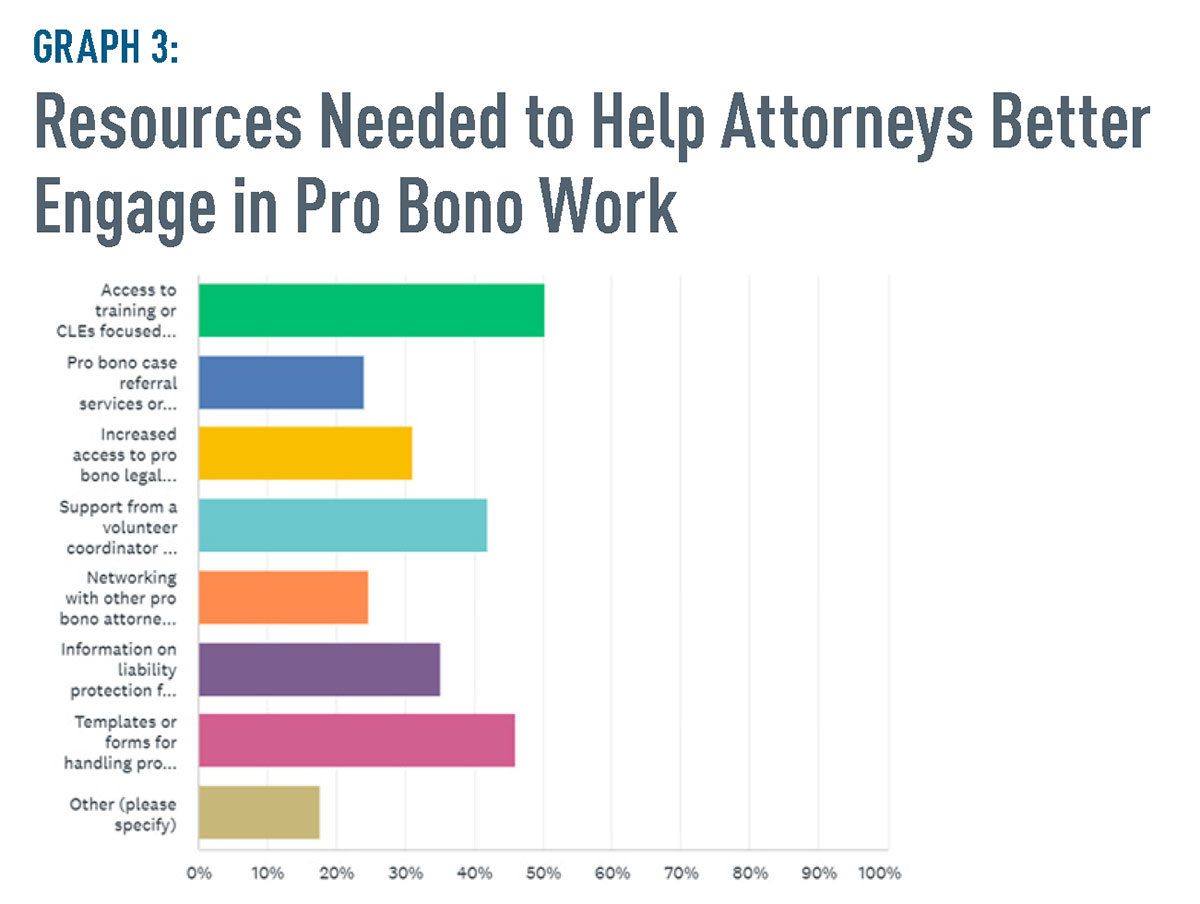
By now, you have heard about the critical role that civil legal aid plays in ensuring access to justice for all Wisconsinites. You discovered Wisconsin’s detrimental civil legal aid crisis[1]; learned about the barriers that prevent lawyers from contributing their time and expertise to pro bono service and how to overcome them[2]; and, most recently, identified how to fit pro bono into your own personal practice.[3] It is no secret that the need is high, the expertise is narrowly tailored, and the opportunities are readily available. Yet, some attorneys are still apprehensive about doing pro bono work.
A recent survey conducted by the State Bar of Wisconsin’s Legal Assistance Committee found that, next to “lack of time due to existing caseload” (47.25%), the “lack of training or expertise in areas requiring pro bono assistance” (35.71%) was the most common reason that attorneys do not engage in pro bono work (see Graph 1). It is no surprise, then, that “mentorship or training in unfamiliar areas of law” (39.39%) and “collaboration with other attorneys or legal professionals for support” (42.05%) topped the list of factors that would encourage attorneys to take on pro bono cases (see Graph 2).
What these attorneys might not understand is that there are lawyers and legal professionals out there whose specific role is to make pro bono work as easy and effective as possible for both the lawyers who perform it and the clients who benefit from it. In this article, I highlight the pivotal role of pro bono coordinators in bridging the gap between legal aid needs and attorney participation.

The Landscape of Civil Legal Aid
To recap, Wisconsin’s civil legal aid crisis is exemplified by the fact that Wisconsin has the lowest level of state funding for civil legal aid in the nation. Notably, the Wisconsin Legislature allocates $0 in state funding for the crucial programs that help people overcome barriers to employment, seek refuge from domestic violence, maintain stable housing, and more. That leaves Wisconsin with one legal aid lawyer for every 4,300 people with incomes below 125% of the federal poverty level.[4]
 Abrielle R. Newman, U.W. 2021, Legal Action of Wisconsin Inc., Milwaukee, is coordinator of Legal Action of Wisconsin’s Eviction Defense Project and a member of the State Bar of Wisconsin’s Legal Assistance Committee, Public Interest Law Section board, and Young Lawyers Division board.
Abrielle R. Newman, U.W. 2021, Legal Action of Wisconsin Inc., Milwaukee, is coordinator of Legal Action of Wisconsin’s Eviction Defense Project and a member of the State Bar of Wisconsin’s Legal Assistance Committee, Public Interest Law Section board, and Young Lawyers Division board.
Recent data from Legal Action of Wisconsin[5] shows that in 2024, while the organization worked on 11,695 cases, it had to turn away another 21,519 eligible cases. That same year, however, 195 volunteer attorneys worked on 1,615 cases, spending 6,828 pro bono hours working to reduce the justice gap. This work was done primarily through the Eviction Defense Project, Expungement & Criminal Record Clearing Clinics, the Consumer Debt Defense Clinic, and Bankruptcy Clinics. Without question, the success of these clinics is due to the volunteer attorneys who do the work. But these clinics could not exist without the expert support and supervision of their pro bono coordinators.

Role of the Pro Bono Coordinator
In my role as coordinator of Legal Action of Wisconsin’s Eviction Defense Project, my goal is to make brief-service eviction defense representation as easy, efficient, and dignified as possible. Every week, volunteer attorneys gather at the Milwaukee County Courthouse and accompany otherwise unrepresented tenants through their court hearings by providing same-day, limited-scope representation. While the attorneys provide this representation, I am behind the scenes acquiring clients, serving as a liaison to the court, answering volunteers questions, intervening when necessary, stocking materials, and making sure that the only thing the volunteer needs to worry about is the exceptional legal representation they provide our clients.
Outside of the clinic, the goal does not change. My fellow pro bono coordinators and I exist to help attorneys feel secure and supported in their pro bono work, and the data shows that our efforts are exactly what attorneys say will help them do just that.
Supporting Attorneys in Pro Bono Work
The Legal Assistance Committee’s survey asked attorneys what resources would help them better engage in pro bono work (see Graph 3). The three most popular answers were “access to training or CLEs focused on pro bono areas of law” (50.40%), “templates or forms for handling pro bono cases” (46%), and, of course, “support from a volunteer coordinator or pro bono program” (42%).
Here are some ways pro bono coordinators in Wisconsin have already worked to create these resources.
Skill Development. The biggest way that pro bono coordinators support their volunteers is by providing ample training and skill development. This most often comes from providing in-person, live webcast, and on-demand training opportunities that offer free continuing legal education (CLE) credits. In 2024, Legal Action of Wisconsin offered more than 10 free training courses for our volunteers across different subject matters that are now available on demand. Each spring, Judicare Legal Aid hosts a free, two-day virtual CLE program with six different legal topics. The Marquette Volunteer Legal Clinics provide monthly training on salient legal issues seen in their clinics. Pro bono coordinators care about their volunteers developing the skills they need to succeed. If there is an area of law or practice that would help you engage in pro bono work, let a pro bono coordinator know! I guarantee there will be a CLE opportunity on the docket within the next few months.
Administrative Assistance. Ask any pro bono coordinator and they will tell you that their top priority is to help volunteers provide high-quality legal services to their clients. One way to do this is by handling the logistics of the representation (for example, intaking clients, filing documents, and communicating with courts) so that the volunteer attorney needs only to focus on the legal work. In essence, pro bono coordinators strive to remove unnecessary stressors from the pro bono experience. Another way that pro bono coordinators remove stressors and help volunteers provide high-quality services to their clients is by creating a knowledge bank of useful template documents and other resources, so no one has to recreate the wheel. As experts in the subject matter, pro bono coordinators have pleadings, briefs, and letters from their own practice that they will always share. Don’t hesitate to ask for examples or assistance in drafting documents – the resources are already out there!
Engagement and Support. Significantly, pro bono coordinators want volunteers to feel engaged and supported. That means creating opportunities for pro bono work that are interesting, relevant, and doable. It means asking for feedback and implementing those suggestions. It means showing appreciation and gratitude for all the work. The pro bono coordinator role exists for the sake of volunteers. Your ideas are not just welcome; they are needed.

Conclusion
There is a clear disconnect between the perceived barriers to pro bono service and the resources available to help reduce those barriers. Pro bono coordinators can serve as the liaison between those two ends that make them meet. By utilizing their expertise and taking advantage of the opportunities they create, pro bono work will feel much more attainable. And when the work is attainable, it will get done and done well. And that is what serves the public good.
Endnotes
1 Megan E. Lee, Bridging the Justice Gap Amid Growing Challenges, 98 Wis. Law. 33 (Jan. 2025).
2 Katie Mertz, Pro Bono: If You Don’t Do It, No One Else Can, 98 Wis. Law. 49 (March 2025).
3 Ashleigh M. Hacker, Pro Bono Service in Private Practice: Where and Why to Fit It In, 98 Wis. Law. 39 (May 2025).
4 Jeff Brown, WisTAF Funding Update, Wis. Access to Just. Comm’n (May 11, 2022), https://wisatj.org/wistaf-funding-update.
5 Legal Action of Wisconsin, https://legalaction.org.
» Cite this article: 98 Wis. Law. 43-45 (September 2025).
